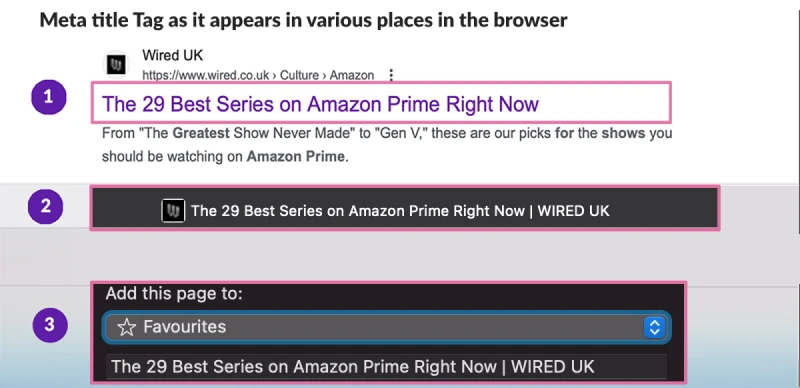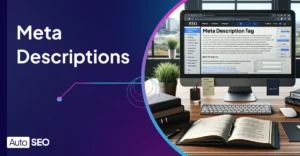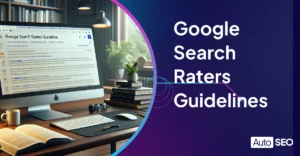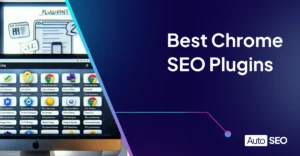Meta Title

Wondering why some webpages catch your eye while others fade into obscurity?
Meet one of SEO’s unsung hero— the highly underrated meta title.
This guide will show you how to craft meta titles that turn heads AND gets fingers clicking.
Table of Contents
Why Bother?
In a world where AI algorithms can write poetry and your smart fridge can browse the internet, a killer meta title is still a golden ticket to standing out on crowded search engine results pages (SERPs).
Meta Title Caught Your Eye? 👀
Here’s a question. How often have you clicked because the title grabbed you?
That’s the magic of a optimized meta description and meta title at work. It might not be the only thing determining how your page ranks, but a compelling meta title can be the irresistible hook drawing you in—and let’s face it, in today’s attention economy, that first click is gold.
So, are you ready to dive in and become a Meta Title Master?
Let’s suit up!
“Meta Title Is That Even English!?”
Yes, if the dictionary you’re reading is coded in HTML!
The term meta title refers to a title tag—an HTML snippet that tells search engines what your webpage is about. You’ll find it between the <head> tags in the body of your HTML document. Look for the spot that says:
<title>YOUR TITLE COMES HERE</title>These tags are more than just on-site page elements; they’re your calling card for search engine algorithms and are vital for SEO (Search Engine Optimization).
Skeptical? Consider this.
Meta tags and descriptions scored a robust 7.87/10 in Moz’s ranking factors survey. %%Make this a quote
Moz, Search Engine Ranking Factors
What Does A Meta Title Look Like?
📸 Visual Cue: The image below combines three primary scenarios where meta titles appear inside your browser: First, among the plethora of links on a SERP (search engine results page). Second, as a reference on your web page browser tab. Third, when you add a page to your ‘Favorites.’

These are by no means the only places where meta titles will be visible. You’ll see often see them on social media shares and mobile search results, unless specific Open Graph meta tags have been applied.
In short, they appear anywhere the article’s title is valuable. They may be a minor SEO element, but a high Moz rating validates their importance.
Meta Titles, the Swiss Army Knife of SEO
Your meta title tags serve more than just identifying your page; they also play an important role in search engine optimization.
Search Engine Spotlight: Meta titles are among the first elements search engines crawl. They command algorithmic attention, which makes them prime real estate for keyword placement.
Click Magnet: An engaging meta title can spike your click-through rate (CTR), and more clicks translate to increased user engagement which in turn can lead to increased ranking
SERP Positioning: A strong meta title boosts your SERP ranking, increasing visibility; this is crucial since many users don’t go past the first page of Google.
Keyword Significance: The right keywords, strategically placed, boost your relevance and SERP ranking.
User Experience: A clear, high-quality meta title, coupled with a compelling meta description, sets clear expectations for the user, potentially reducing bounce rates.
📝 Note: While a well-crafted meta title can significantly enhance your search engine positioning, it’s not a silver bullet. A complete SEO strategy requires several other components to be effective. Once you’ve optimized your meta title, we invite you to explore our other articles to complete your SEO puzzle.
What Factors Are Important for Search Engines?
It’s pretty simple, really:
- Length: Between 50-60 characters, including spaces for optimal visibility; this ensures your title is displayed fully in search engine results.
- Uniqueness: Eliminate duplicate content issues with a unique meta tag for each page.
- Keyword Placement: Prioritize placing your target keyword immediately for maximum SEO impact.
- Relevance: Ensure high engagement by using accurate title descriptors. Misleading titles can result in high bounce rates.
- Brand Name: Infuse your brand identity without compromising keyword focus. It’s often beneficial to place it nearer the end of the title.
- Special Characters: Use special characters like pipes (“|”) or dashes (“-“) to separate different parts of the title for readability. However, avoid non-alphanumeric characters as they may not display correctly in search results.
- HTML Syntax: The title tag should be placed within the <head> section of the HTML document and should look like this: <title>Your Page Title Here</title>.
- Avoid Keyword Stuffing: Excessive keywords are a one-way ticket to a Google search engine penalty.
- Encoding: Stick to standard UTF-8 characters to ensure the title displays correctly across browsers and platforms.
- Local SEO: If applicable, consider including geo-specific terms for local search optimization.
By adhering to these technical requirements, you can optimize your meta titles for both search engines and users, thereby improving your website’s visibility and click-through rates.
Meta Title Versus Page Title, Understanding the Difference
Here’s where it’s easy to get confused. A Meta Title is what appears in search engine results. It’s the clickable headline providing a first-look preview of your content and (as such) is one of the first elements crawled by search engines, which makes it important for your SEO.
The Page Title is what the user sees when they land on your page. Often these two are identical. However, you’ll often find that while a Meta Title is great for enticing in visitors, it doesn’t display nicely on your site. Therefore, the page title, more accurately your H1, might be different. This, and all of our blog posts here at AutoSEO, are a perfect example of this.
Meta Titles That Pack a Punch: Winning in SEO and Voice Search
Google CEO Sundar Pichai has stated this year that Google’s search experience “will evolve substantively over the next decade.” By this, he means that search is starting to evolve from keyword-centric algorithms to conversational AI language models.
As a result, Meta Titles find themselves at a crossroads. They’re no longer just keyword fodder for Google’s search results; they’re beginning to become part of the conversational landscape of Large Language Models (LLMs) like ChatGPT and BARD.
So, how do you ace Meta Titles in this new era?
How to Write a Outstanding Meta Title
Keywords on Point: Make sure your target keyword is front and center. Do your research, brainstorm, spy on competitors (use tools like SEMRush or ahrefs), and type in topics on Google. Check out the “Related Searches” section.
Ditch Keyword Stuffing: It’s a turn-off, and no one wants to read robot copy. Your meta title should sound like you wrote it, not a bot. Keyword research tools can also give you a leg up. Google’s Keyword Planner, UberSuggest, and Moz’s Keyword Explorer are worth looking at. They’ll give you keyword ideas and suggestions and show you what the competition level is for them.
Audience Know-How: Think about terms your audience might be looking for. Be aware of the trends happening in your niche, and try to write title tags that align with those conversations. Think about the way people speak as well as the way they type. Jargon isn’t always the right choice. If you can nail the terms people seek, you’re mining semantic gold!
Be Original: Easier than it sounds, but the web doesn’t reward copy and paste. Write meta descriptions that are as original as you are. Think in conversational terms and craft a unique meta-description that aligns with your audience’s search intent
Optimize for Mobile: With over 57% of web content being viewed on smaller screens you need to ensure your meta titles grab the attention of mobile users. Keep your titles snappy and keyword rich and focus on brevity over filler.
Utilizing AI for Writing Meta Titles
With the right series of prompts you can speed up your meta title writing process. You can find a few examples here. However, when using AI to write prompts do remember that the results you get are only as good as your input.
Great Meta Title Examples
Below are a few examples of Meta Titles that we believe meet the requirements. Of course, these are just a few of many and may not be ideal for you. I’ve always found that it’s much better to know your audience and target your title accordingly rather than taking random examples from online of “what’s great”.
After all “Find the Best VPNs Online for Streaming and Security” sound great but following the same template “Find the Best Caskets Online for Comfort and Reliability” does not! %%Quote
1. Dishoom: The Best Indian Food in London
- Keywords: Dishoom, Best Indian Food, London
- Length: 36 characters
- Informativeness: High; specifies the restaurant and its unique selling proposition.
- Rating: 10/10
This meta title shows excellent in terms of SEO, contains relevant keywords, and speaks directly to the search intent to find high-quality Indian food in London. It’s well under the character limit and is highly engaging.

2. Oppenheimer’ review: Christopher Nolan’s latest stunner
- Keywords: Oppenheimer review, Christopher Nolan
- Length: 48 characters
- Informativeness: High; the title mentions that it’s a review, includes the name of the director (Christopher Nolan), and hints at the quality of the film (“latest stunner”).
Rating: 9/10
This Meta Title is very strong. It’s concise, includes key information that users are likely to search for, and has a touch of editorial flair (“latest stunner”) that could entice clicks. It’s also well within the character limit.

Time to Optimise Your Meta Title Tag
There you have it, everything you need to optimise your meta titles, now go ahead and do it yourself. Remember though that Meta Titles might need changing over time so ensure that it’s part of your regular technical SEO audit.

Written by John Buckley
A writer and creative media producer, John explores the intersection of technology and human identity, leveraging AI tools for artistic and meaningful storytelling and delving into the ethical implications of a rapidly evolving digital landscape.



